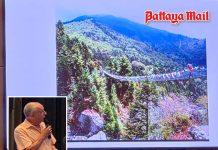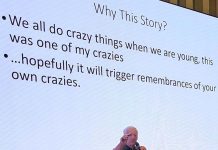“Nelson Mandela is one of greatest political figures of the last 100 years.” This is the view of Desmond Bishop who spoke last Sunday and provided some personal reflections on Nelson Mandela – the man, the activist, the politician and the icon.
Desmond lived in Rhodesia (now Zimbabwe) and spent time in South Africa. He previously spoke to the club about his books “Goodbye, Africa” and the “Wizard of Zee.” For more information on “Goodbye, Africa,” see http://desmondbishop.webs.com.
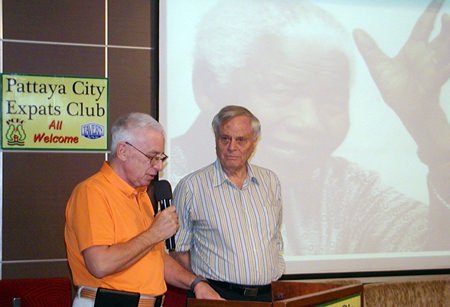 Guest speaker for Pattaya City Expats Club on 19th of January was member Desmond Bishop; his topic was “personal reflections on Nelson Mandela”. Here MC Richard Silverberg introduces Desmond.
Guest speaker for Pattaya City Expats Club on 19th of January was member Desmond Bishop; his topic was “personal reflections on Nelson Mandela”. Here MC Richard Silverberg introduces Desmond.
Desmond said that Mandela is comparable to Mahatma Gandhi; and that, indeed, he was influenced by Gandhi. For the most part, the activism Mandela practised in the anti-apartheid struggles was non-violent. He was labelled a terrorist by some. Technically, this was accurate, Desmond said, because he was involved in bombing some infrastructure. But he did not believe in killing people in these attacks.
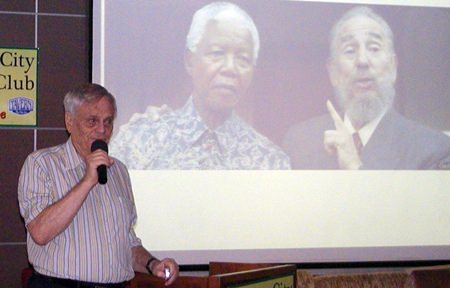 Desmond spoke of Mandela’s life, and how he was inspired by Mahatma Gandhi; he spent 27 years in prison for opposing apartheid, and when released refused to seek revenge. Picture shows Mandela as President of South Africa with the President of Cuba, Fidel Castro.
Desmond spoke of Mandela’s life, and how he was inspired by Mahatma Gandhi; he spent 27 years in prison for opposing apartheid, and when released refused to seek revenge. Picture shows Mandela as President of South Africa with the President of Cuba, Fidel Castro.
Further, Mandela had many qualities. “He was resilient, forgiving and warm.” The day Mandela was released from prison, in 1990; Desmond said that he was tuning in to media coverage from Canberra, Australia, anxious to see what Mandela would say. Mandela kept him – and journalists around the world – waiting for five hours. It turns out Mandela was having tea with his jailers. Desmond remarked that that said a lot about Mandela as reconciler.
In Desmond’s opinion, just surviving in prison for 27 years was an accomplishment; many apartheid activists died while in custody. Desmond mentioned that he has vivid memories of a very defiant Mandela as he spoke at his trial in 1964. He spoke for four hours, declaring that he was prepared to die for what he believed in.
Desmond spoke about some of the important people in Mandela’s life, such as his first wife, Minnie (“treated harshly by the government; tarnished by her involvement in the killing of a young boy”); Bishop Desmond Tutu (“denied a chance to speak at the Mandela family funeral”); and National Party leader and the last apartheid President of South Africa, F.W. DeKlerk (“was involved in some very hard bargaining with Mandela prior to his release from jail”).
Further, after Mandela’s death, the memorial service held for him, attended by numerous world leaders, was an amazing event. Broadcast networks like the BBC and the Australian Broadcasting Corporation stayed with it for a full four hours.
Mandela’s appearance at the final match of the rugby World Cup in 1995, where he presented the trophy to the winning team from South Africa, the Springboks, was a defining moment in Mandela’s presidency and in South African history. The Springboks was an all-white team and their fans were almost universally white South Africans. Black South Africans saw the Springboks as a symbol of apartheid, but Mandela told fellow members of the African National Congress, “These are our boys. You know, they are playing for us. We have to embrace them.” It was an incredible gesture of reconciliation, Desmond said (this event was the basis of the Clint Eastwood movie “Invictus” starring actor Morgan Freeman as Mandela – http://www. youtube.com/watch?v=RZY8c_a_dlQ).
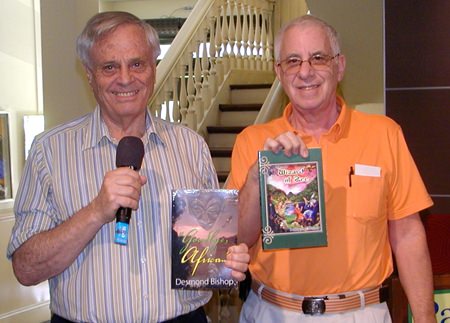 Desmond’s books include “Goodbye, Africa” and the “Wizard of Zee.” For more information on “Goodbye, Africa,” see http://desmondbishop.webs.com.
Desmond’s books include “Goodbye, Africa” and the “Wizard of Zee.” For more information on “Goodbye, Africa,” see http://desmondbishop.webs.com.
Not everything about Mandela and his legacy was rosy, Desmond said. Mandela served only one term as president. There remains a large gap between rich and poor. Johannesburg has the highest crime rate of any major city in the world. There are still limits on the jobs that black South Africans can aspire to and many blacks are still paid less than their white counterparts.
In response to a question from the audience concerning whether Mandela had contributed to the oppressed becoming the oppressors in South Africa, Desmond said, “Mandela reconciled people but did not materially change the structure of South Africa. Some reverse discrimination is okay, but it is a touchy issue.”
After Desmond answered several other questions, Master of Ceremonies Richard Silverberg brought everyone up to date on upcoming events and called on Roy Albiston to conduct the Open Forum, where questions are asked and answered about Expat living in Thailand, especially Pattaya.
Learn more about the Club’s meetings and other activities by visiting their website at www.pcecclub.org.



